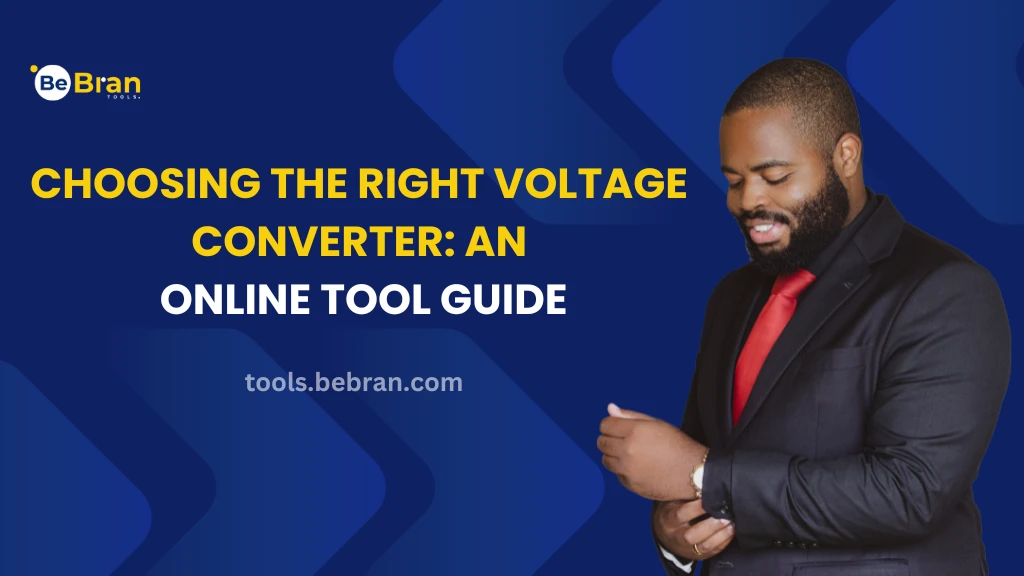
Choosing the Right Voltage Converter: An Online Tool Guide
In an increasingly connected and global world, the need for online voltage converters has become more prominent than ever. Whether you're traveling abroad, purchasing appliances from overseas, or setting up international equipment, understanding and choosing the right voltage converter is essential. This comprehensive guide aims to simplify the process, highlighting the importance of online tools in selecting the perfect voltage converter for your needs.
Understanding Voltage and Its Importance
Voltage, measured in volts (V), is the pressure that pushes electric current through a conductor. Different countries operate on different voltage systems, typically ranging from 110V to 240V. Using an appliance or device with a voltage different from the supply can lead to damage or even hazards. This is where a voltage converter becomes crucial.
The Role of Voltage Converters
A voltage converter, also known as a voltage transformer, adjusts the electrical output to match the voltage of your device. There are two main types:
- Step-Up Converters: These converters increase voltage, typically from 110V to 220V, suitable for when you're using appliances from countries with higher voltage in areas with lower voltage supply.
- Step-Down Converters: These decrease voltage, say from 220V to 110V, ideal for using devices from lower voltage regions in countries with a higher voltage standard.
Identifying Your Voltage Conversion Needs
Before choosing a converter, determine the voltage requirements of your device (usually found on its label or manual) and the voltage supply of the country where you'll use it. Also, consider the wattage of your device. Devices with high power consumption, like hair dryers or kitchen appliances, require converters with higher wattage capacity.
Using Online Tools for Voltage Converter Selection
Numerous online tools simplify the process of selecting the right voltage converter. These tools often include:
- Voltage Compatibility Checkers: Enter your device’s voltage and the country’s voltage to see if you need a converter.
- Wattage Calculators: Input the device's specifications to calculate the required wattage for the converter.
- Product Finder Tools: Based on your inputs, these tools suggest suitable converters available for purchase.
Check this out: The Science Behind Torque Converters Understanding The Basics | Binary Code To Human Readable Text
Factors to Consider When Choosing a Converter
- Compatibility: Ensure the converter is compatible with the device's voltage and plug type.
- Wattage Capacity: The converter should support the wattage of your device. A good rule of thumb is to choose a converter with a wattage rating 50% higher than your appliance.
- Safety Features: Look for converters with safety features like surge protection, voltage stabilization, and thermal fuses.
- Portability: If you're traveling, a compact and lightweight converter is ideal.
- Quality and Certification: Opt for a converter from a reputable brand with necessary certifications and warranties.
Advantages of Online Voltage Converter Tools
- Convenience: Easily accessible from anywhere, allowing quick and hassle-free selection.
- Accuracy: Provides precise calculations and recommendations, reducing the risk of choosing the wrong converter.
- Variety: Showcases a wide range of options, including the latest models and technologies.
Common Misconceptions About Voltage Converters
Universal Compatibility: Not all converters work with every device. High-wattage appliances often require specific types of converters.
Dual Voltage Devices: Some modern devices are dual voltage, meaning they can operate on both 110V and 220V without a converter. Always check before purchasing a converter.
The Future of Voltage Conversion
With technology advancing, the future may bring more sophisticated and universal solutions to voltage conversion, further simplifying global connectivity. Innovations might include more efficient, adaptable, and integrated systems, reducing the need for separate converters.
Read More: Demystifying Torque Converters A Comprehensive Guide | Choosing The Right Torque Converter Tool For Your Vehicle
Conclusion
Choosing the right voltage converter is crucial for the safe and effective use of your devices in different voltage zones. Utilizing online tools not only simplifies the selection process but also ensures accuracy and suitability for your specific needs. By understanding your requirements and leveraging these digital resources, you can confidently select the ideal voltage converter for any situation.
Free Tools: Free TIFF to PDF Tool Online | Free Excel To PDF Tool Online
Frequently Asked Questions
1. What is a voltage converter?
A voltage converter is a device that changes the voltage of an electrical power source to match the voltage requirement of a specific device or appliance.
2. How do I know if I need a voltage converter?
You need a converter if the voltage of your electrical device (e.g., 110V) differs from the power supply in your location (e.g., 220V).
3. What's the difference between a step-up and step-down converter?
A step-up converter increases voltage (e.g., from 110V to 220V), while a step-down converter decreases it (e.g., from 220V to 110V).
4. How do I choose the right wattage for my converter?
Check your device's wattage requirement (usually listed on it) and select a converter with a higher wattage rating for safe operation.
5. Can I use a single voltage converter for multiple devices?
Yes, but ensure the total wattage of all devices doesn't exceed the converter's wattage capacity.
6. Are there universal voltage converters?
Some converters are designed to handle multiple voltages, but always check compatibility with your specific devices.
7. Do voltage converters also change plug types?
Some do, but it's not universal. You might need a separate plug adapter.
8. Can I use a voltage converter for high-power appliances?
Yes, but ensure the converter can handle the appliance's high wattage.
9. How accurate are online voltage converter selection tools?
These tools are generally accurate but always double-check your device's specifications for certainty.
10. Are voltage converters safe to use?
When used correctly and chosen based on accurate specifications, voltage converters are safe. Look for converters with safety certifications.



